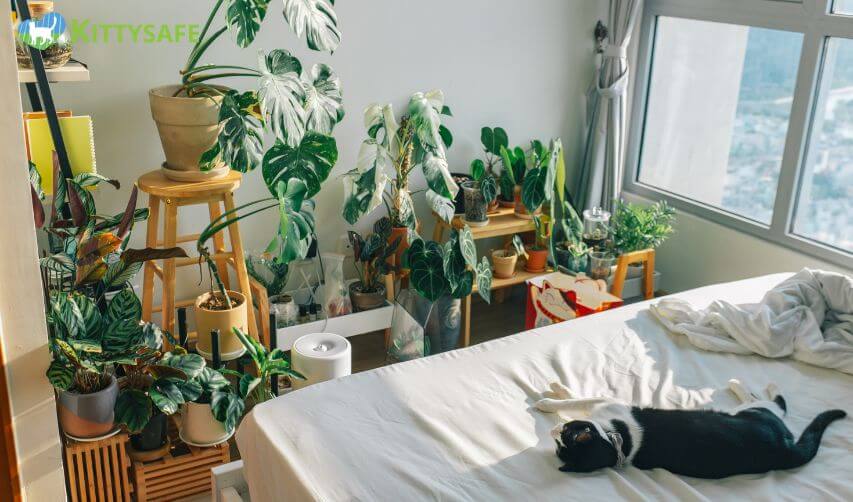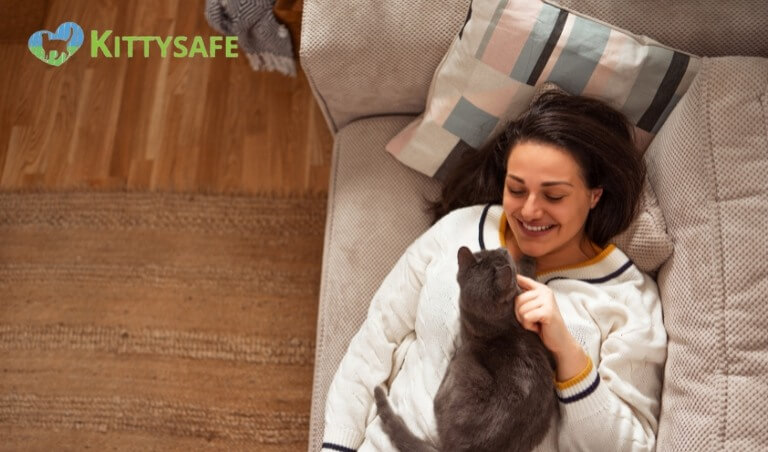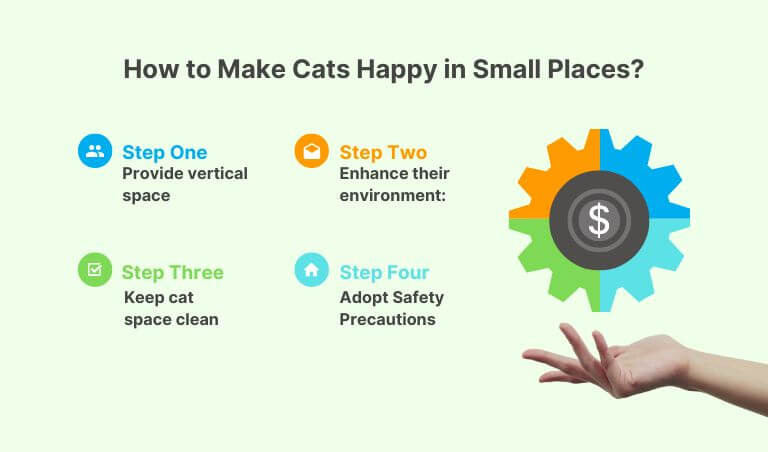When considering adopting a furry companion, many cat owners ask themselves: How much space does a cat need to be happy? This question is particularly relevant for pet owners living in smaller homes or apartments. Understanding how much space a cat needs to thrive can be challenging. The cat’s size, age, activity level, and the house’s layout determine the answer. However, with sufficient care, some cats can learn to live peacefully in any space configuration. Remember, the joy and fulfillment that a cat can bring to your life is immeasurable, and providing them with the right space is crucial to meet their needs.
After all, HAPPY CATS IS A HEALTHY CAT!

How Much Space Does a Cat Need?
Cats do best when they have plenty of space to roam and play. There’s no exact formula for figuring out how much space an indoor cat needs to be happy. Cats are happy living in a twenty-square-meter apartment as in a mansion, but remember that cats need vertical room for climbing, and please don’t put your cats in a cage.
Situation | Recommended Space [Square Meter] |
| Single Cat | 20 |
| Two Cats | 27 |
| Small Apartment | 18-27 |
| Outdoor Space (Cat Enclosure) | 3-6 |
| Cat Shelter (Individual Space) | 4 |
The Importance of Space for Cats:
Cats are solitary hunters by nature, and they have a strong need for their own space. They establish their core territory, which they patrol and defend, and mark it as their own. A cat’s territory is not just about space; it is a place where they explore, play, and feel safe and secure. This sense of security allows them to engage in their natural activities like hunting and scratching.
Space also provides opportunities for cats to engage in their mental and physical activities. A well-maintained space allows a cat to climb, jump, and explore. These activities are not only a medium of fun for cats but also important for maintaining their overall health. It also stimulates a cat mentally and helps to prevent boredom and stress levels.
Key Factor Influencing Space Needs for Your New Feline Member:
Cats do best when they have plenty of space to roam and play. There’s no exact formula for figuring out how much space an indoor cat need. But cats must be provided with twenty-square-meter of minimum space. However, the amount of space a cat needs depends upon the several factors like breed, size, age, and individual personality of the cat.
Age:
Kittens and younger cats are generally more active and curious, as they need more territory to play and explore. Older cats prefer quieter, smaller areas. They stay closer to home, beside their bowl and litter tray, where they can rest undisturbed. So, while determining how much space your cat will require, consider his or her life stage.
Health and Mobility:
As compared to healthy agile cats, others with health issues or mobility limitations will have different space needs. By providing them easy access to the essential areas and a joyful environment, you can create a secure and comfortable space that caters to their needs. It doesn’t matter whether your cats are younger or older with health concerns; a well-designed space contributes to their happiness and well-being.
Breed and Size:
Every cat has unique needs, which become more apparent when considering their breed and size. Larger felines like the Maine Coon will need more square meterage than smaller breeds like the British short hair.
Personality:
Every cat has its own personality. Some felines are more adventurous and social and prefer more space to explore and interact. At the same time, some cats prefer to stay more reserved and love cosy spaces and confined places. So, you can create an environment that promotes their well-being according to their personality.
Space Considerations For Outdoor Cats:
When it comes to the space needed for cats that live outdoors, there is quite a difference compared to cats living indoors. Outdoor cats love to roam and explore, so they need larger areas where they can play, climb, and hunt. Generally, the outdoor cat must be provided with at least 100 square feet of space, depending on their personality and preferences.
When you’re setting up a space for outdoor cats, there are a few important things to consider:
- Make sure the area is secure to keep them from wandering off the property.
- Provide shaded areas to protect them from the sun and cozy spots to rest.
- Include climbing structures, scratching posts, and toys to keep them entertained.
- Offer weatherproof shelters to keep them dry and warm in bad weather.
- Give your pet a safe place to hide where they can retreat and feel safe.
- Inspect for any gaps and loose ends that might let them escape or provide a passage for predators to get in.
Are Cats Happy in Small Apartments?

Cats are small creatures, which makes them the most suitable companions for people living in small apartments or single rooms compared to any other companions. Although some breeds of cats, like Maine Coon are more energetic than others and need more space compared to others, most of the cats can live happily in small apartment buildings.
If you are a cat owner living in a small apartment or a pet lover considering adopting a furry companion in a small apartment, you can go ahead. Your cats can happily live in small apartments with proper love and care.
How to Know If Your Cat Requires More Space?
Cats are known for being quite expressive about their living space. They’ll let you know if they’re not happy with their space. You must keep an eye out for these eight signs:
- Aggressive Physical Signs: If your cat is hissing, spitting, puffing up their fur, or running away when you approach, they’re probably telling you they need their personal space. They might shrink back or jump away if you get too close.
- Changes in Eating Habits: A sudden loss of appetite or eating too fast or too little can be a sign that your cat is feeling a bit stressed out about their personal space.
- Unusual Sleeping Habits: If your cat is sleeping more than usual or has irregular sleep patterns, it could be a sign that they are stressed out and require more space to play and explore.
- Over Grooming: Excessive grooming can be a sign of stress, boredom, and even loneliness, indicating they are not happy or need some space and attention.
- Destructive Behavior: If your cat is shredding your furniture and other belongings when you’re not home, it could be a sign of separation anxiety.
- Hiding: Cats are masters of disguise, and they might hide if they feel threatened or insecure in their environment.
- Unusual Aggression: If your cat is growling, biting, or pinning back their ears, it could be a sign that they are discomfort about their territory.
- Bathroom Habits: If your pet is using the bathroom outside of their litter box, it could be a sign of depression or a medical issue that requires immediate attention.
How to Make Cats Happy in Small Places?

Once you have adopted a cat or a cat owner living in a small space, the next step is to keep your furry friend happy in its own space. But don’t worry; with just a little time and effort, you can effectively create a cat-friendly environment where your companions can relax and play.
- Provide vertical space: Cats love to climb up to monitor their territory. So, you must install wall-mounted cat shelves and window perches to give your cat places to monitor their territory and make them feel secure. It also saves floor space, and at the same time, your cat can fulfil its instincts.
- Enhance their environment: To keep your cat physically active and mentally stimulated, provide them with plenty of toys, scratching sports, tunnels, and scratching posts, etc.
- Keep cat space clean: Cats are naturally clean animals, but their litter and food create an odour in small places. To avoid these odours, you should regularly scoop their litter box and wash their food bowls.
- Safety Precautions: Cats are great climbers and scratchers, so you must consider cat-proofing your apartment with cat-netting enclosures to provide a safe space for such activities.
Should You Give Your Cat the Spare Room?
Cats are more like us, and they love having their own little space to chill out. So it’s a good idea if you are considering providing a spare room for your furry companion. They’ll really appreciate having their own private room to do their activities. Although cats need our care and attention to fulfil their basic needs like food and water, a solely dedicated room for cats can provide advantages like:
- Private space to rest, play, and feel secure.
- Provide enough vertical space for play, toy placement, scratching posts, and accommodation of cat furniture.
- Helps to keep litter boxes and food bowls in different areas far from one another for your cat’s comfort and hygiene.
- You can give your cat safe heaven, especially if you have other pets or children.
Final Thought:
As we conclude our discussion on “How much space does a cat need?” It’s clear that there is no single solution that fits all cats. Each cat has its own personality, preferences, and energy levels that play a significant role in determining their space requirements.
Although some cats love cozy corners, others can need more space to roam and explore. Ultimately, the key is to observe your cat’s behavior and adapt their space to suit their needs. Whether you live in a tiny apartment or a spacious house, you can create a loving and enriching environment for your cat. Remember, it’s not just about the physical space but also about the quality of the interactions and experiences you provide. Happy cat parenting!
FAQs:
Is One Room Enough for Cats?
Not unless it’s a big room. Ideally, the space required is at least 20 meters and includes vertical climbing space, shelves, cat trees, plenty of toys, cozy beds, and access to clean litter boxes to make a smaller area feel larger and more stimulating. This enrichment keeps your cat happy and healthy.
Do Indoor Cats Need Lots of Spaces?
No, indoor cats don’t require lots of space. They should have a minimum of around twenty square meters of space to be comfortable.
Do Cats Dislike Small Places?
No, cats often find small spaces attractive. Although some cats may prefer larger and open spaces, they often enjoy small enclosed areas. Small places provide a sense of security and comfort to the cat, making them feel secure and comfortable. This doesn’t mean cats don’t need space as well, though
Are Cats Ok to Live Alone?
Yes, cats can generally live happily alone as they are naturally independent creatures and have access to food and water. Cats do, though have a social side and they need interacton with you, or with pother cats. Any animal left alone can begin to show signs of depression.
Can a Cat Live in an Apartment?
Yes, a cat can live happily in an apartment with the right care and setup. The owner must provide enrichment through toys, scratching posts, hiding spots, and climbing structures to keep their cat engaged and active.





